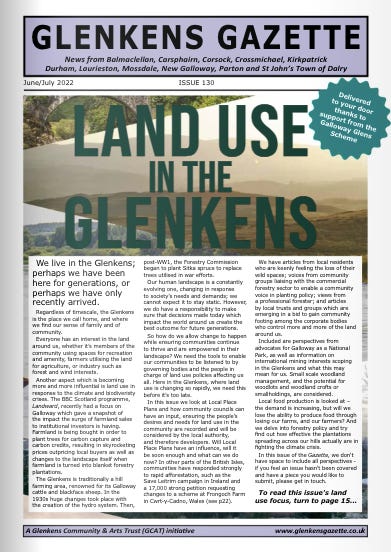Time flies when you’re having fun; as we write this introduction, it’s been almost exactly a month since we officially launched the Scottish Beacon website.
In that month, we’ve published more than forty stories from our 21 partners on everything from period products and petitions to housing and hedgehogs. Our site has brought together coverage spanning the length and breadth of the country, from Orkney and Shetland to Dumfries and Galloway and everywhere in between.
And as well as local news itself, we’ve been pleased to host pieces on sector-wide issues - like this blog from Public Interest News Foundation’s Hani Barghouthi on the need for a global set of values when negotiating the relationship with big tech companies.
We’re proud of our busy first month and grateful to our brilliant partners for their work, but we’re still just getting started. We have lots of plans for how to develop the project, but we’d also love to hear your thoughts and feedback on what you’d like to see and get involved in — so get in touch with us at hello@scottishbeacon.com.
In the meantime, we hope you enjoy reading some of our partners’ stories and learning more about them and what we’ve been working on since our launch. What better way to celebrate a one-month anniversary!
Latest News on our website…
Shetland Islands Council wants more community benefits in the form of cheaper energy prices - Shetland News.
Islay: Community Climate Action Plan - The Ileach
Think Outside The Books: Explore the exciting transformations at Alexandria and Clydebank’s public libraries - Clydesider.
It’s asbestos, not just RAAC, that schools need to be concerned about - Midlothian View.
Edinburgh: Fresh Start For Old Royal High School - Broughton Spurtle
Number of people in temporary homes almost halved in Midlothian - Midlothian View
Shetland: Sovereign campaigner told in court to be of good behaviour - Shetland News
Exciting News!
The Scottish Beacon founder and Project Manager Rhiannon Davis is currently away for six weeks on a Churchill Fellowship, visiting New York, New Jersey, Philadelphia, Denver, Chicago and Vancouver to meet innovative community and local news organisations who are working to plug the democratic deficit left by the closure of traditional local news outlets.
It will be a great opportunity to introduce Scottish Beacon to collaborative journalism projects abroad and create cross-border partnerships. We can’t wait to hear from Rhiannon about her trip and experiences.
During the period Rhiannon is away, the journalist Eve Livingston will be supporting the work at Scottish Beacon.
Meet our partners…
In each newsletter, we’ll introduce you to one of our partners. Next up, it’s Sarah Ade - Editor of The Glenkens Gazette.
Tell us about your publication.
The Glenkens Gazette was created by a local shopkeeper 23 years ago as a folded A3 sheet on his kitchen table. He wanted to showcase what was going on in the communities of the Glenkens, as he felt there was lots to tell, and often, people weren’t aware of what was going on in the neighbouring villages.
How/when/why did you get involved?
I took on the role of assistant editor in 2006, which then grew into the role of designer and then overall co-ordinator/jack of all trades! I worked as a freelance journalist then and had just returned to the Glenkens, where I grew up, after years of living and studying in other cities such as Newcastle, London and Amsterdam. The community has always been important to me. I felt the Gazette was vital in reinforcing the connections across the Glenkens communities, which I have endeavoured to develop and enhance over time.
What does your average day look like when working for the publication?
I've been working on the publication for so long that many elements that go into putting each issue together are incorporated into my day-to-day life. I am chatting with people out and about, emails and phone calls, and noticing matters impacting the community. Once it gets to the deadline, I spend much of my day on my laptop, either at the living room table or a local office space where I can be a little more social! There is a lot of emailing and phoning to chase articles, stretching the deadline to accommodate late submissions, editing text and collating things onto the page, and getting each page's design right. Also, we sometimes have a particular 'focus' in a publication, which means gathering and sometimes writing pieces on an essential topic across the Glenkens – issues such as land use, housing and education.
Tell us about something you are proud of - whether it be a particular story you broke or an impact you had on an issue?
I enjoy pulling a ‘focus’ issue together, having identified an area that is key across all our communities at that point. It means I can delve into a topic and engage with others who are experts in a particular field. I enjoy ensuring the articles give a balanced overview and feel proud when it all comes together. I think this is something through which an excellent local publication can impact the communities it represents. For instance, the Housing issue we ran resulted in a funded local housing survey and a real focus on attention and potential funding through wind farm funds and other avenues, hopefully benefiting our local communities' housing situation.
How does the existence of your publication benefit the community you serve?
One thing vital in local publications such as the Gazette is that it aims to present balanced perspectives on key local issues, often written by local people. We always include names alongside pieces, which encourages a broader understanding and willingness to be open to different perspectives, in contrast to today’s online world of echo chamber experiences where someone can so easily believe the whole world has the same view as they do. If you see a piece in the Gazette and it’s not something you’re particularly interested in or in agreement with, if you see it’s written by Mrs. so-and-so who lives next door, you may be more inclined to actually read it and also potentially be more sympathetic to the opinions or information included. So, I think it helps to broaden people’s horizons and encourage empathy and understanding within our communities.
What made you want to join the Scottish Beacon?
We worked with Rhiannon, who created the Greater Govanhill publication when we decided to develop our online hub (www.glenkens.scot), and when she told me about a new project she was putting together that would enable small community publications across Scotland to communicate and therefore, see correlations between issues impacting their communities, and discuss approaches to hyper-local publications, etc, I thought it sounded fascinating and like something that could have tremendous value.
Why does independent, community-based local news matter?
Nowadays, with any news from anywhere in the world at people’s fingertips and often tailored to their interests through clever search functions, I think it’s vital to have authentic, local print publications that enable you to engage with the world around you and relate to the people within your community. Most commercial local newspapers nowadays are owned by giant corporations such as the Mirror Group, which owns The Mirror, The Sun and probably other tabloids. To have small independent publications focusing on real community issues that impact people’s day-to-day lives is vital and, in my opinion, becoming more so.
Elsewhere in local news…
Back in July, the News Media Association spearheaded a campaign calling for the BBC to ‘be a better neighbour’ by changing its plans for expanding its local offerings across the country. The campaign is backed by several local news titles — but a new op-ed by former Guardian editor Alan Rusbridger this week argued that the public broadcaster could be part of the solution instead of the problem.
A new report out of the US this summer painted a stark picture of local news funding, highlighting that over half of American daily news outlets are controlled by hedge funds and private equity firms. This blog from Nieman Lab summarises the report’s findings and explores its wider context.
Closer to home, the new platform Ping! has been launched to help hyperlocal stories find a wider audience and ensure their publishers are paid fairly for them. Journalism.co.uk spoke to its director to find out more about how the initiative, funded by Google’s Digital News Initiative Fund in collaboration with the Independent Community News Network and Cardiff University, is working so far.










